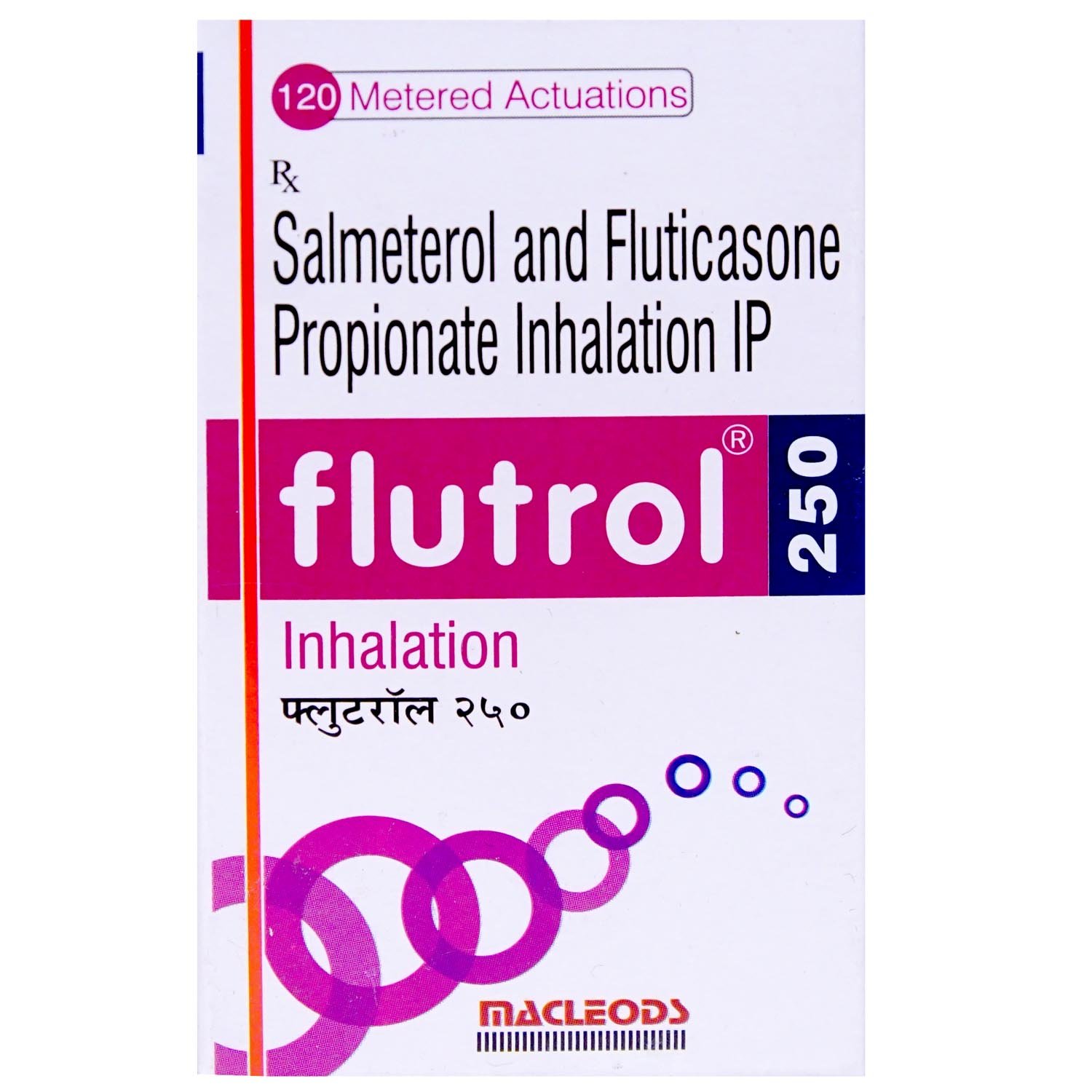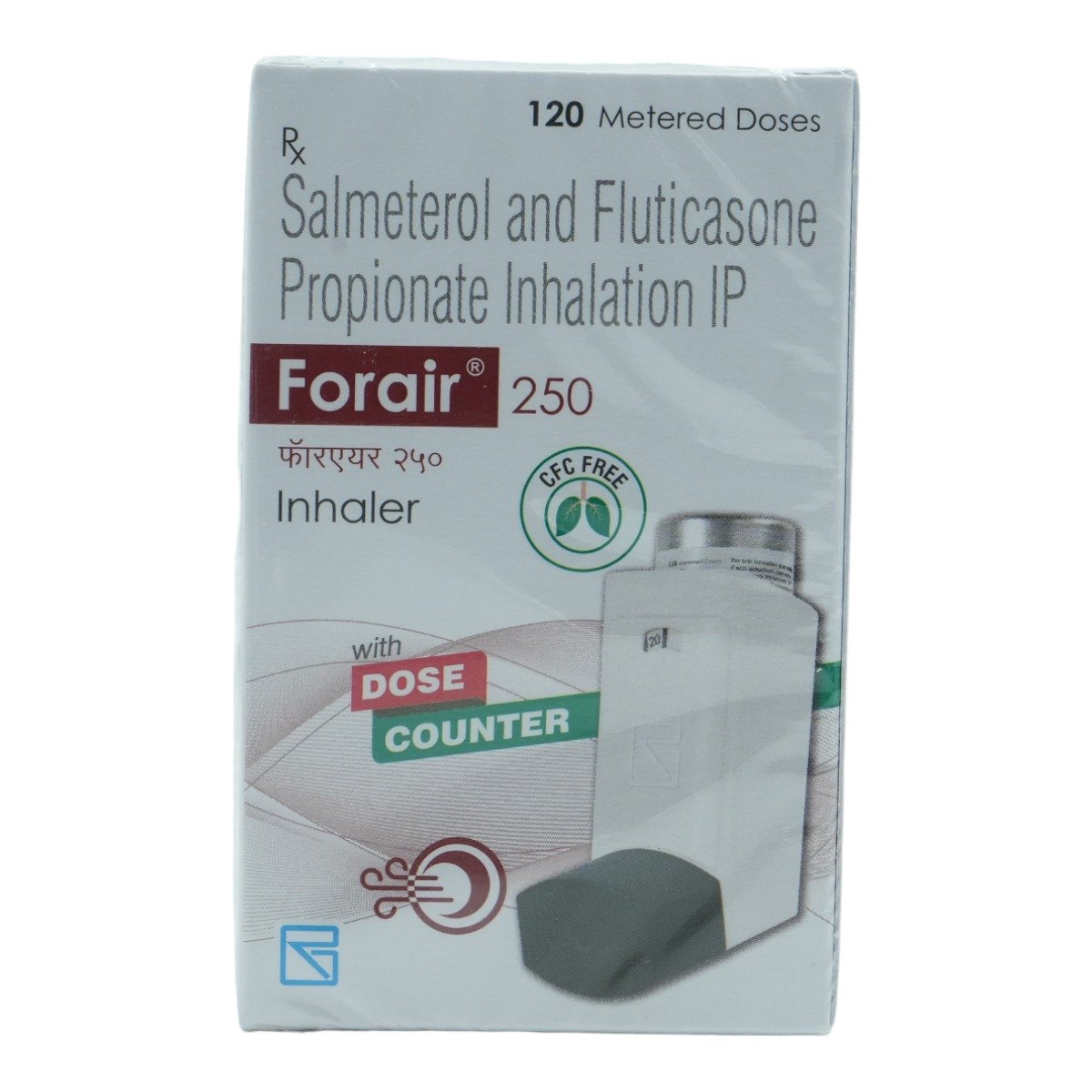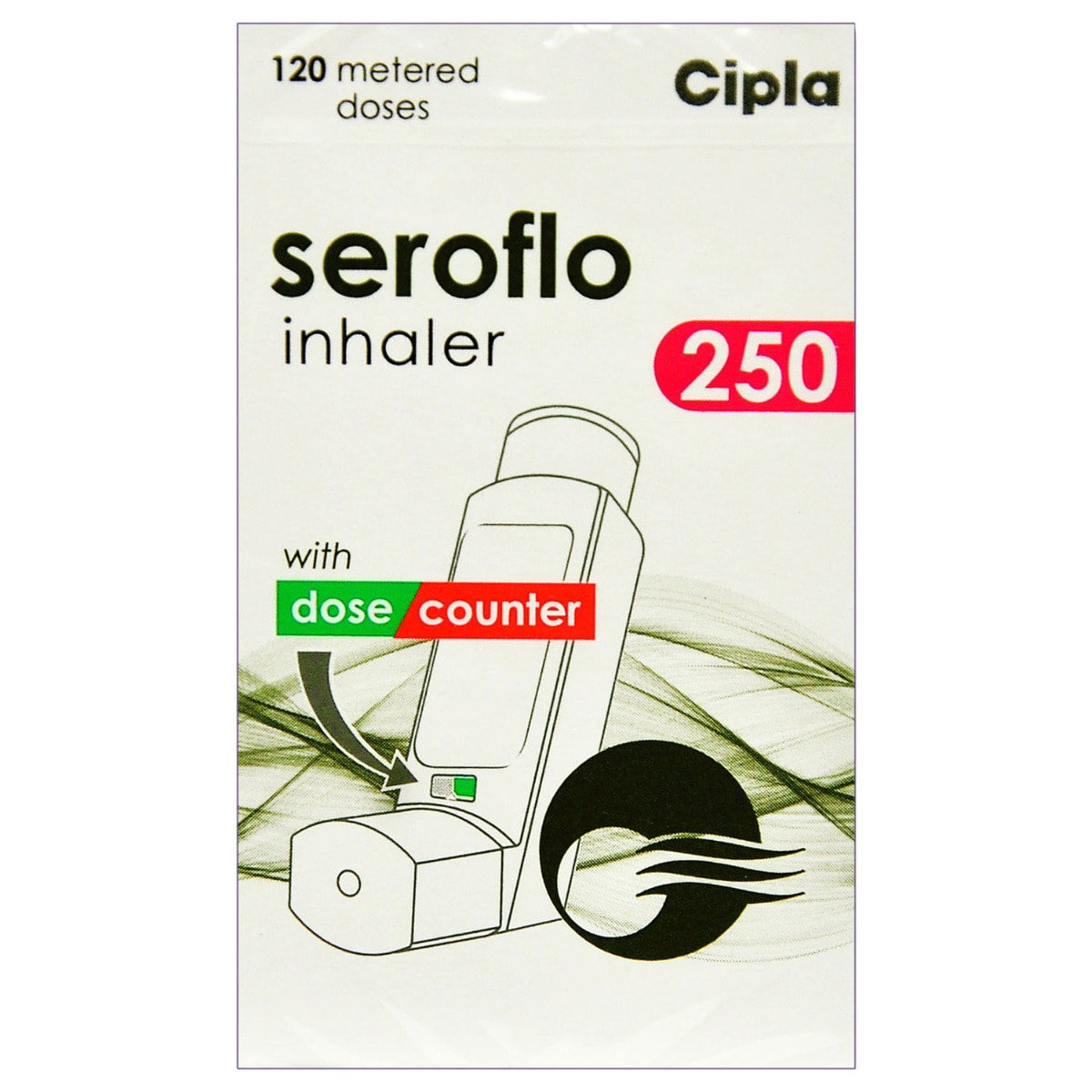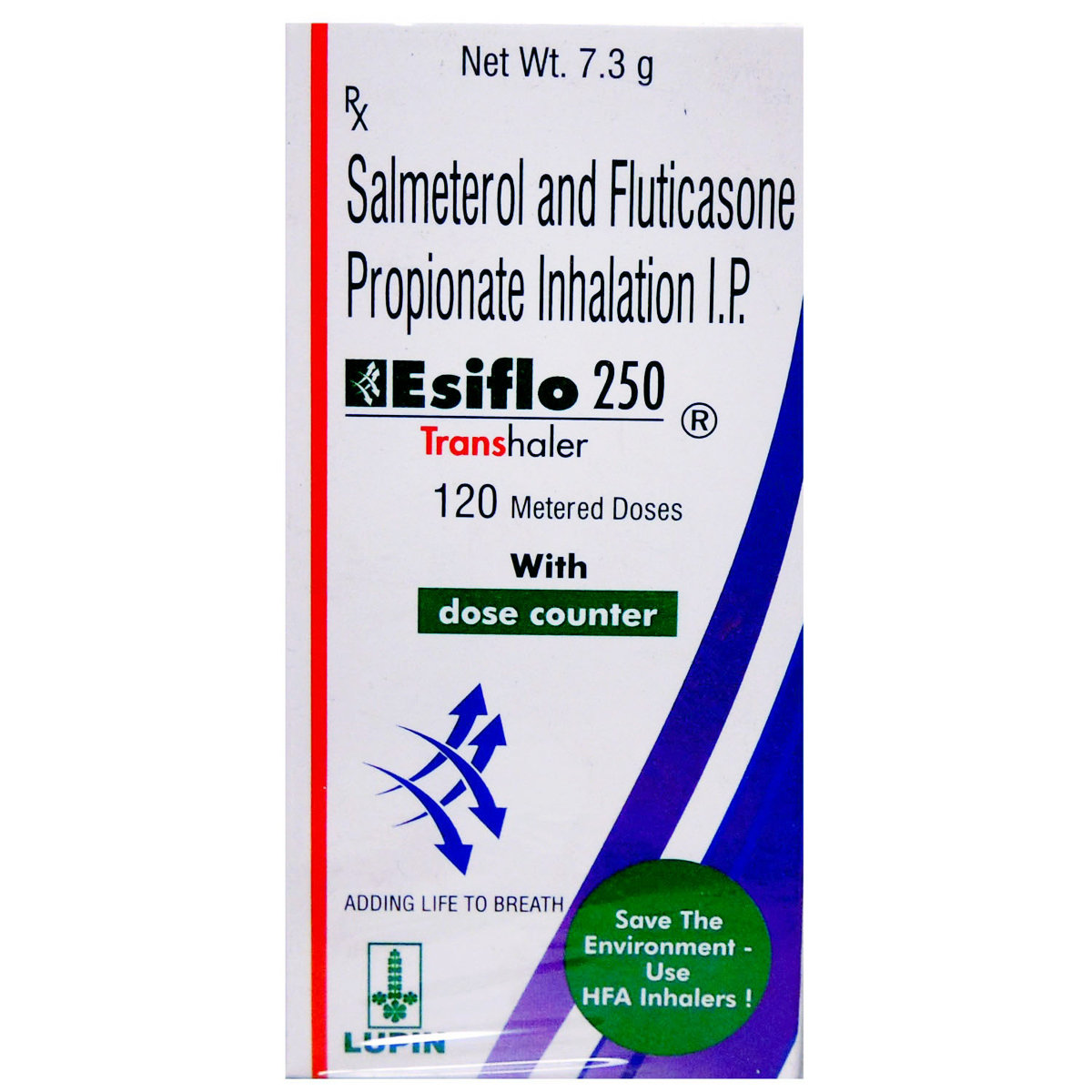Digihaler SF 250 Inhaler 120 mdi






MRP ₹735.5
(Inclusive of all Taxes)
₹110.3 Cashback (15%)
Provide Delivery Location
Online payment accepted
 Prescription drug
Prescription drugWhats That
Composition :
Manufacturer/Marketer :
Consume Type :
Expires on or after :
Return Policy :
About Digihaler SF 250 Inhaler 120 mdi
Digihaler SF 250 Inhaler 120 mdi is a respiratory medication primarily used to treat and prevent asthma and chronic obstructive pulmonary diseases (COPD) like bronchitis (inflammation of the lining of your bronchial tubes) and emphysema (shortness of breath). Asthma is a chronic (long-term) respiratory condition in which airways narrow, swell, and produce extra mucus, leading to difficulty breathing. COPD is a group of lung diseases that causes obstructed airflow from the lungs.
Digihaler SF 250 Inhaler 120 mdi combines two drugs: Salmeterol (bronchodilator) and Fluticasone propionate (corticosteroid). Salmeterol is a long-acting bronchodilator which works by relaxing the muscles in the airways and widening the airways. Thus, it makes breathing easier. Fluticasone propionate belongs to the class of corticosteroids that works by acting on the nasal lining's inner cells and stopping releasing certain chemicals in the body that cause inflammatory reactions. Thereby providing relief from sneezing, runny or blocked nose and sinus discomfort.
Digihaler SF 250 Inhaler 120 mdi is for inhalation only. Take Digihaler SF 250 Inhaler 120 mdi by inhaling the number of puffs as your doctor advises. Your doctor will recommend how often you take Digihaler SF 250 Inhaler 120 mdi based on your medical condition. Some people may experience headaches, stomach upset, dizziness, nervousness, vomiting, Respiratory tract infection, Fungal infection of the mouth, Hoarseness of voice, Sore throat, Cough, Musculoskeletal (bone, muscle or joint) pain, and Increased heart rate. Most of these side effects of Digihaler SF 250 Inhaler 120 mdi do not require medical attention and gradually resolve over time. However, if the side effects persist or worsen, please consult your doctor.
Inform your doctor if you are allergic to Digihaler SF 250 Inhaler 120 mdi or other ingredients. If you are pregnant or breastfeeding, please inform your doctor before using Digihaler SF 250 Inhaler 120 mdi. Digihaler SF 250 Inhaler 120 mdi is not recommended for children below 12 years of age. Use of Digihaler SF 250 Inhaler 120 mdi may worsen asthma symptoms in some patients. If you experience severe difficulty breathing, please consult a doctor immediately to prescribe an alternative medicine. Your doctor will prescribe a short-acting inhaler to use during attacks. If you have high blood pressure, diabetes, chest or lung infections, hyperthyroidism (overactive thyroid), hypokalaemia (low potassium levels in the blood), glaucoma, cataracts, osteoporosis (weak bones), tuberculosis, heart, liver or adrenal gland problems, inform your doctor before taking Digihaler SF 250 Inhaler 120 mdi.
Uses of Digihaler SF 250 Inhaler 120 mdi
Directions for Use
Key Benefits
Digihaler SF 250 Inhaler 120 mdi is used to treat and prevent respiratory disorders like asthma and chronic obstructive pulmonary disease (COPD). Digihaler SF 250 Inhaler 120 mdi improves pulmonary function and effectively treats and prevents the worsening of emphysema (shortness of breath) and chronic bronchitis (inflammation of the lining of your bronchial tubes). Digihaler SF 250 Inhaler 120 mdi is a combination of two drugs: Salmeterol and Fluticasone propionate, which is used to treat asthma symptoms and chronic obstructive pulmonary disease (COPD). Salmeterol belongs to the class of bronchodilators that relax muscles and widen the lungs' airways. Thus, it makes breathing easier. Fluticasone propionate belongs to the class of corticosteroids that works by acting on the nasal lining's inner cells and stopping the release of certain chemicals in the body that cause inflammatory reactions. Thereby providing relief from sneezing, runny or blocked nose and sinus discomfort.
Storage
- Hydrate your body: Drink enough water to prevent dehydration and headaches.
- Calm Your Mind: Deep breathing and meditation can help you relax and relieve stress.
- Rest and Recharge: Sleep for 7-8 hours to reduce headache triggers.
- Take rest: lie down in a quiet, dark environment.
- Cold or warm compresses can help reduce tension.
- Stay Upright: Maintain good posture to keep symptoms from getting worse.
- To treat headaches naturally, try acupuncture or massage therapy.
- Over-the-counter pain relievers include acetaminophen and ibuprofen.
- Prescription Assistance: Speak with your doctor about more substantial drug alternatives.
- Severe Headaches: Seek emergency medical assistance for sudden, severe headaches.
- Frequent Headaches: If you get reoccurring headaches, consult your doctor.
- Headaches with Symptoms: Seek medical attention if your headaches include fever, disorientation, or weakness.
- A blocked nose can be relieved by drinking more water, which helps clear fluids.
- Use saline nasal spray available over the counter to relieve blockage or blow harder to remove the mucus.
- Use nasal strips that can be placed on the nose to widen nostrils and increase airflow.
- Keep a humidifier around to moisten air at home/workplace.
- Please inform your doctor about joint pain symptoms, as they may adjust your medication regimen or prescribe additional medications to manage symptoms.
- Your doctor may prescribe common pain relievers if necessary to treat joint discomfort.
- Maintaining a healthy lifestyle is key to relieving joint discomfort. Regular exercise, such as low-impact sports like walking, cycling, or swimming, should be combined with a well-balanced diet. Aim for 7-8 hours of sleep per night to assist your body in repairing and rebuilding tissue.
- Applying heat or cold packs to the affected joint can help reduce pain and inflammation.
- Please track when joint pain occurs and any factors that may trigger it, and share this information with your doctor to help manage symptoms.
- If your joint pain is severe or prolonged, consult a doctor to rule out any underlying disorders that may require treatment.
- Inform your doctor about dizziness symptoms. They may adjust your medication regimen or prescribe additional medications to manage symptoms.
- Follow your doctor's instructions for taking medication, and take it at the same time every day to minimize dizziness.
- When standing up, do so slowly and carefully to avoid sudden dizziness.
- Avoid making sudden movements, such as turning or bending quickly, which can exacerbate dizziness.
- Drink plenty of water throughout the day to stay hydrated and help alleviate dizziness symptoms.
- If you're feeling dizzy, sit or lie down and rest until the dizziness passes.
- Track when dizziness occurs and any factors that may trigger it, and share this information with your doctor to help manage symptoms.
- Inform your doctor about the nausea and discuss possible alternatives to the medication or adjustments to the dosage.
- Divide your daily food intake into smaller, more frequent meals to reduce nausea.
- Opt for bland, easily digestible foods like crackers, toast, plain rice, bananas, and applesauce.
- Avoid certain foods that can trigger nausea, such as fatty, greasy, spicy, and smelly foods.
- Drink plenty of fluids, such as water, clear broth, or electrolyte-rich beverages like coconut water or sports drinks.
- Use ginger (tea, ale, or candies) to help relieve nausea.
- Get adequate rest and also avoid strenuous activities that can worsen nausea.
- Talk to your doctor about taking anti-nausea medication if your nausea is severe.
- Record when your nausea occurs, what triggers it, and what provides relief to help you identify patterns and manage your symptoms more effectively.
- Please inform your doctor about joint pain symptoms, as they may adjust your medication regimen or prescribe additional medications to manage symptoms.
- Your doctor may prescribe common pain relievers if necessary to treat joint discomfort.
- Maintaining a healthy lifestyle is key to relieving joint discomfort. Regular exercise, such as low-impact sports like walking, cycling, or swimming, should be combined with a well-balanced diet. Aim for 7-8 hours of sleep per night to assist your body in repairing and rebuilding tissue.
- Applying heat or cold packs to the affected joint can help reduce pain and inflammation.
- Please track when joint pain occurs and any factors that may trigger it, and share this information with your doctor to help manage symptoms.
- If your joint pain is severe or prolonged, consult a doctor to rule out any underlying disorders that may require treatment.
- Regular exercise, like swimming, walking, and yoga, can help reduce bone pain by strengthening muscles and releasing natural pain relievers.
- Physical therapy, including stretching, strengthening exercises, TENS (a type of therapy using electrical pulses), and massage, can help ease bone pain and improve movement.
- Mind-body techniques, like relaxation, meditation, and hypnosis, can reduce pain and help control muscle tension that comes with bone pain.
- Acupuncture may help reduce bone pain by triggering the release of natural painkillers and easing nerve discomfort.
- Avoid sitting for long periods; take short walks or stretch regularly.
- Herbs like turmeric and ginger might help with bone pain.
- Eat a diet rich in calcium, vitamin D, and protein for strong bones and muscles.
- Quit smoking and limit alcohol.
Drug Warnings
Please tell your doctor if you are allergic to Digihaler SF 250 Inhaler 120 mdi or other ingredients. If you are pregnant or breastfeeding, please inform your doctor before using Digihaler SF 250 Inhaler 120 mdi. Digihaler SF 250 Inhaler 120 mdi is not recommended for children below 12 years of age. Use of Digihaler SF 250 Inhaler 120 mdi may worsen asthma symptoms in some patients. If you experience severe difficulty breathing, please consult a doctor immediately so that alternative medicine may be prescribed. Contact your doctor if you have blurred vision or any other vision disturbances while taking Digihaler SF 250 Inhaler 120 mdi. Regular monitoring of potassium levels is recommended while taking Digihaler SF 250 Inhaler 120 mdi as it may cause low potassium levels in the blood. If you have high blood pressure, diabetes, chest or lungs infection, hyperthyroidism (overactive thyroid), hypokalaemia (low potassium levels in the blood), glaucoma, cataracts, osteoporosis (weak bones), tuberculosis, heart, liver or adrenal gland problems, inform your doctor before taking Digihaler SF 250 Inhaler 120 mdi.
Drug-Drug Interactions
Drug-Drug Interactions
Login/Sign Up
Co-administration of Digihaler SF 250 Inhaler 120 mdi with Mifepristone may make Digihaler SF 250 Inhaler 120 mdi less effective as a therapy.
How to manage the interaction:
Taking Digihaler SF 250 Inhaler 120 mdi with Mifepristone is not recommended, consult a doctor before taking it. Do not stop using any medications without talking to a doctor.
The combined use of Carteolol and Digihaler SF 250 Inhaler 120 mdi can reduce the effect of Digihaler SF 250 Inhaler 120 mdi.
How to manage the interaction:
Taking Digihaler SF 250 Inhaler 120 mdi with Carteolol together can result in an interaction, but it can be taken if your doctor has advised it. Do not stop using any medications without a doctor's advice.
Using sotalol together with Digihaler SF 250 Inhaler 120 mdi may reduce the effects of both medications, which can lead to low treatment outcomes.
How to manage the interaction:
There may be a possibility of interaction between sotalol and Digihaler SF 250 Inhaler 120 mdi, but it can be taken if prescribed by a doctor. If you experience any symptoms, contact a doctor immediately. Do not discontinue any medications without consulting a doctor.
When Ribociclib is taken with Digihaler SF 250 Inhaler 120 mdi, it can increase the chance of a serious abnormal heart rhythm. If you suffer from any cardiac conditions, or electrolyte disturbances (such as magnesium or potassium deficiency brought on by severe or prolonged diarrhea or vomiting), you may be at higher risk.
How to manage the interaction:
There may be a possibility of interaction between Digihaler SF 250 Inhaler 120 mdi and Ribociclib, but it can be taken if prescribed by a doctor. However, if you experience sudden dizziness, lightheadedness, fainting, breathing difficulty, or rapid heartbeat, consult the doctor immediately. Do not stop any medications without a doctor's advice.
The combined use of Troleandomycin and Digihaler SF 250 Inhaler 120 mdi can increase the risk of irregular heart rhythm.
How to manage the interaction:
Co-administration of Digihaler SF 250 Inhaler 120 mdi with Troleandomycin can result in an interaction, but it can be taken if your doctor has advised it. You should seek immediate medical attention if you develop sudden dizziness, lightheadedness, fainting, shortness of breath, or heart palpitations. Do not stop using any medications without talking to a doctor.
Taking Carvedilol and Digihaler SF 250 Inhaler 120 mdi may reduce the effects of both medications.
How to manage the interaction:
There may be a possibility of interaction between Digihaler SF 250 Inhaler 120 mdi and Carvedilol, but it can be taken if prescribed by a doctor. Do not stop using any medications without a doctor's advice.
Using levobunolol ophthalmic together with Digihaler SF 250 Inhaler 120 mdi may reduce the benefits of both medications. It may increase the risk of severe asthmatic attacks or breathing problems.
How to manage the interaction:
There may be a possibility of interaction between Digihaler SF 250 Inhaler 120 mdi and Levobunolol, but it can be taken if prescribed by a doctor. Do not stop using any medications without a doctor's advice.
The combined use of Metipranolol and Digihaler SF 250 Inhaler 120 mdi can increase the effect of both Metipranolol and Digihaler SF 250 Inhaler 120 mdi. It may increase the risk of severe asthma attacks or breathing problems.
How to manage the interaction:
Although there is a possible interaction between Digihaler SF 250 Inhaler 120 mdi and Metipranolol, you can take these medicines together if prescribed by your doctor. Do not stop using any medications without a doctor's advice.
The combined use of Delavirdine and Digihaler SF 250 Inhaler 120 mdi can increase the risk of irregular heart rhythm.
How to manage the interaction:
Co-administration of Digihaler SF 250 Inhaler 120 mdi with Delavirdine can result in an interaction, but it can be taken if a doctor has advised it. You should seek immediate medical attention if you develop sudden dizziness, lightheadedness, fainting, shortness of breath, or heart palpitations. Do not stop using any medications without talking to a doctor.
Darunavir may significantly increase the blood levels of Digihaler SF 250 Inhaler 120 mdi. High blood levels of Digihaler SF 250 Inhaler 120 mdi can increase the risk of an irregular heart rhythm that may be serious.
How to manage the interaction:
Although taking Darunavir and Digihaler SF 250 Inhaler 120 mdi together can cause an interaction, it can be taken if a doctor has suggested it. However, if you experience sudden dizziness, lightheadedness, fainting, breathing difficulty, or rapid heartbeat, consult the doctor immediately. Do not stop any medications without a doctor's advice.
Drug-Food Interactions
Drug-Food Interactions
Login/Sign Up
Diet & Lifestyle Advise
- Eat a healthy diet and exercise regularly to strengthen your breathing muscles and boost your immune system.
- Avoid foods such as cabbage, beans, garlic, onions, shrimp, pickled food, dried fruits, fried foods, carbonated drinks, wine, and bottled lemon and lime juice, as it may worsen asthma symptoms.
- Do meditation, deep breathing, regular exercise, and try progressive muscle relaxation techniques to relieve stress and reduce an asthma attack risk.
- Quit smoking may reduce the effectiveness of the Digihaler SF 250 Inhaler 120 mdi and irritate the lungs' worsening breathing problem.
- Learning breathing exercises will help you move more air in and out of your lungs.
Side Effects of Digihaler SF 250 Inhaler 120 mdi
- Low fever
- Chest tightness
- Fungal infection in the mouth
- Sinus pain
- Nausea
- Stomach upset
- Dizziness
- Nervousness
- Muscle and bone pain
- Sleep problems
- Vomiting or irregular heartbeat
Habit Forming
Therapeutic Class
All Substitutes & Brand Comparisons
RX
Out of StockSalflute 250 Inhaler
Axa Parenterals Ltd
₹510
(₹3.83/ 1MDI)
30% CHEAPERRX
Seroflo 250 mcg Ecopack Inhaler 200 MDI
Cipla Ltd
₹887
(₹3.99/ 1MDI)
27% CHEAPERRX
Out of StockLudoflu-S 250 CFC-Free Inhaler
Lxir Medilabs Pvt Ltd
₹562
(₹4.22/ 1MDI)
23% CHEAPER
Product Substitutes
Drug-Diseases Interactions
Drug-Diseases Interactions
Login/Sign Up
FAQs
Digihaler SF 250 Inhaler 120 mdi contains salmeterol and Fluticasone propionate. Salmeterol works by relaxing muscles and widening the airways of the lungs. Fluticasone propionate works by acting inside the nasal lining cells and stops the release of certain chemicals in the body that cause inflammatory reactions. Thereby relieving sneezing, runny or blocked nose, and sinus discomfort and making breathing easier.
No, you are not recommended to take sotalol with Digihaler SF 250 Inhaler 120 mdi as it may reduce the effectiveness of both medicines. Also, sotalol may trigger asthma attacks or worsen breathing problems by narrowing airways. However, please consult a doctor before using other medication with a Digihaler SF 250 Inhaler 120 mdi.
Yes, the Digihaler SF 250 Inhaler 120 mdi may cause fungal infection in the mouth as a side effect. It is not necessary for everyone taking Digihaler SF 250 Inhaler 120 mdi to experience this side effect. However, to avoid such side effects, brush your teeth or rinse your mouth with water after using Digihaler SF 250 Inhaler 120 mdi every time.
Drug-Drug Interactions Checker List
- AMITRIPTYLINE
- RITONAVIR
- INDINAVIR
- LEVODOPA
- PROCARBAZINE
- SAQUINAVIR
- SALBUTAMOL
- DIGOXIN
- SOTALOL
- PROCAINAMIDE
- FUROSEMIDE
- PREDNISONE
- BECLOMETASONE
- TELITHROMYCIN
- IMIPRAMINE
- ATENOLOL
- OXYTOCIN
- PHENELZINE
- KETOCONAZOLE
Special Advise
- Your doctor may regularly monitor your blood potassium level as low oxygen level in the blood (hypoxia), and medicines such as Salmeterol + Fluticasone Propionate can lower blood potassium level.
- Be advised to carry an inhaler prescribed by your doctor to use in a sudden asthma attack.
Disease/Condition Glossary
Asthma: It is a breathing problem in which airways narrow, swell, and produce extra mucus, leading to difficulty breathing.
Chronic obstructive pulmonary disease (COPD): Chronic obstructive pulmonary disease is a group of lung diseases that block airflow and make breathing difficult. The most common COPD are emphysema and chronic bronchitis.
Emphysema: It is a lung condition that causes shortness of breath.
Chronic Bronchitis: A lung disease associated with inflammation of the lining of bronchial tubes, which carry air to and from the lungs.

Have a query?
Buy best Respiratory System products by
Cipla Ltd
Lupin Ltd
Glenmark Pharmaceuticals Ltd
Sun Pharmaceutical Industries Ltd
Alkem Laboratories Ltd
Macleods Pharmaceuticals Ltd
Mankind Pharma Pvt Ltd
Zydus Healthcare Ltd
Leeford Healthcare Ltd
Dr Reddy's Laboratories Ltd
Zydus Cadila
Abbott India Ltd
Intas Pharmaceuticals Ltd
Alembic Pharmaceuticals Ltd
German Remedies Ltd
Centaur Pharmaceuticals Pvt Ltd
Ipca Laboratories Ltd
Aristo Pharmaceuticals Pvt Ltd
Pristine Pearl Pharma Pvt Ltd
Wockhardt Ltd
GlaxoSmithKline Pharmaceuticals Ltd
Zuventus Healthcare Ltd
Koye Pharmaceuticals Pvt Ltd
Micro Labs Ltd
Blue Cross Laboratories Pvt Ltd
Medishri Healthcare Pvt Ltd
Med Manor Organics Pvt Ltd
Indiabulls Pharmaceuticals Pvt Ltd
Adonis Laboratories Pvt Ltd
FDC Ltd
Fourrts India Laboratories Pvt Ltd
Tablets India Ltd
J B Chemicals & Pharmaceuticals Ltd
Shreya Life Sciences Pvt Ltd
Divine Savior Pvt Ltd
Indoco Remedies Ltd
Seagull Pharmaceutical Pvt Ltd
Yash Pharma Laboratories Pvt Ltd
Torque Pharmaceuticals Pvt Ltd
Uniza Healthcare Llp
Wings Pharmacuticals Pvt Ltd
Biological E Ltd
Corona Remedies Pvt Ltd
Icarus Health Care Pvt Ltd
Steris Healthcare
Apex Laboratories Pvt Ltd
Geno Pharmaceuticals Pvt Ltd
Navil Laboratories Pvt Ltd
Precept Pharma
Aar Ess Remedies Pvt Ltd
La Renon Healthcare Pvt Ltd
Torrent Pharmaceuticals Ltd
Astra Zeneca Pharma India Ltd
Biochem Pharmaceutical Industries Ltd
Comed Chemicals Ltd
Entod Pharmaceuticals Ltd
Franco Indian Pharmaceuticals Pvt Ltd
Healthgate Pvt Ltd
Intra Life Pvt Ltd
Megma Healthcare Pvt Ltd
Pfizer Ltd
RPG Life Sciences Ltd
Unipark Biotech Pvt Ltd
Votary Laboratories (India) Ltd
Wanbury Ltd
Brinton Pharmaceuticals Ltd
Dolvis Bio Pharma Pvt Ltd
Eisen Pharmaceutical Co Pvt Ltd
Group Pharmaceuticals Ltd
Knoll Pharmaceuticals Ltd
Morepen Laboratories Ltd
Panacea Biotec Ltd
Prevego Healthcare & Research Pvt Ltd
Rnd Laboratories Pvt Ltd
Sanatra Healthcare Ltd
Skn Organics Pvt Ltd
Stedman Pharmaceuticals Pvt Ltd
Thuyam Life Pvt Ltd
Timon Pharmaceuticals Pvt Ltd
Aglowmed Pharmaceuticals Ltd
Ajanta Pharma Ltd
Alniche Life Sciences Pvt Ltd
Bio Warriors Pharmaceucticals Pvt Ltd
Biochemix Health Care Pvt Ltd
Cadila Healthcare Ltd
Cadila Pharmaceuticals Ltd
Caplet India Pvt Ltd
Chemo Healthcare Pvt Ltd
Delcure Life Sciences Ltd
East West Pharma India Pvt Ltd
Elder Pharmaceuticals Ltd
Embiotic Laboratories (P) Ltd
Emcee Pharmaceuticals (P) Ltd
Foregen Healthcare Ltd
Hetero Healthcare Pvt Ltd
Incite Pharmaceuticals
Iva Healthcare Pvt Ltd
Kepler Healthcare Pvt Ltd
Kristal Pharmaceuticals
Lincoln Pharmaceuticals Ltd
Alcohol
Safe if prescribed
The interaction of Digihaler SF 250 Inhaler 120 mdi with alcohol is unknown. However, as a precautionary measure, it is advisable not to take or limit alcohol.
Pregnancy
Consult your doctor
The safety of Digihaler SF 250 Inhaler 120 mdi in pregnant women is unknown. Therefore, it is given to pregnant women only if the doctor thinks the benefits outweigh the risks.
Breast Feeding
Consult your doctor
It is unknown whether Digihaler SF 250 Inhaler 120 mdi is excreted in human milk. It is given to breastfeeding mothers only if the doctor thinks the benefits outweigh the risks.
Driving
Safe if prescribed
Digihaler SF 250 Inhaler 120 mdi usually does not affect your ability to drive or operate machinery.
Liver
Consult your doctor
Use Digihaler SF 250 Inhaler 120 mdi with caution, especially if you have a history of Liver diseases/conditions. The dose may be adjusted by your doctor as required. Please consult your doctor.
Kidney
Consult your doctor
If you have any concerns regarding using Digihaler SF 250 Inhaler 120 mdi in patients with kidney problems, your doctor may adjust the dose as required. Please consult your doctor.
Children
Safe if prescribed
Digihaler SF 250 Inhaler 120 mdi is not recommended for children below 12 years as the safety and effectiveness were not established. However, please consult a doctor before giving Digihaler SF 250 Inhaler 120 mdi to children.









